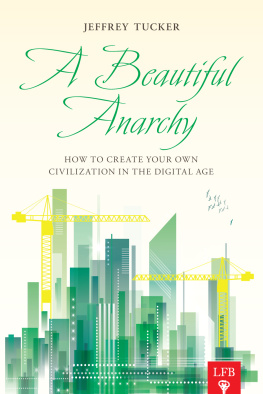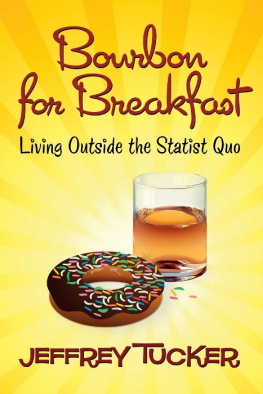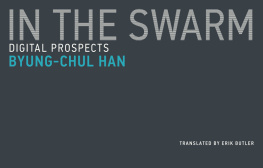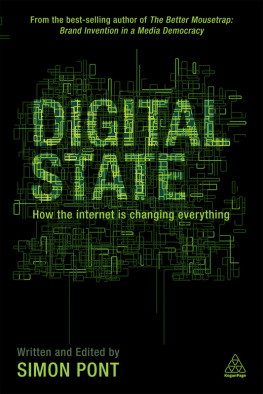A Beautiful Anarchy:
How to Create Your Own Civilization in the Digital Age
A Beautiful Anarchy:
How to Create Your Own Civilization in the Digital Age
By Jeffrey Tucker

Copyright 2012 by Laissez Faire Books
Baltimore, Maryland
All rights reserved.
www.lfb.org
ISBN: 978-1-6212904-0-7
Cover art: Cynthia Schatoff
Published under the Creative Commons Attribution License 3.0.
http://creativecommons.Org/licenses/by/3.0/

Contents
Introduction
From the beginning of time until 1837, the only means to communicate with each other over geographic space too large for yelling was to deliver a message by horse, boat, walking, carrier pigeon, lanterns, bonfires, or smoke signals. Then came the telegraph, the first big break in putting an end to the power of the gatekeeper. We could now communicate directly, peer to peer. And thus began modernity.
The critical fact about communication is its creative power. It is a form of exchange but the goods exchanged are not property but ideas, and this exchange results in new ideas, new intellectual wealth, the precondition for changing the world. Unscripted, uncontrolled, uncensored communication illustrates the productive power of anarchy. The more this communication anarchy advanced, the more it served to build civilization.
The telephone was a Gilded Age invention but the first coast-to-coast telephone call did not happen until 1915. (As for invention, lets please give credit to Elisha Gray, Antonio Meucci, and Thomas Edison, in addition to Alexander Bell.)
By the 1930s, it was possible for almost anyone to make a phone call, provided you could get to the general store. Then came the neighborhood party lines. Even in the 1950s, you had to wait for the person down the street to get off the phone before you could call.
Switchboard operators dominated communication in the 1960s. By the 1970s, every household had its own phone, but it would have to wait another few decades before the end state of this trajectory would be reached: a phone in every pocket with enough power and technology to do instant face time with anyone else on the planet.
It all happened in less than one hundred years.
But notice the trajectory. Year by year, development by development, the market process working with no central plan eventually granted the amazing thing to everyone. Once for groups and communities, the systematic market preference eventually devolves the technological power down to the individual. And once primitive and rudimentary, the market process sharpens and improves all things through time.
And we arent just talking about a phone here. The smartphone is everything: radar detector, musical instrument, blood-pressure checker, game board, weather forecaster, stock checker, book reader, and a million other things, all in a device we can put in our pockets.
The gatekeepers that ruled our ability to communicate, learn, share, and build have been smashed. The barriers that kept that most precious commodity from us information have been toppled. And what has replaced them is a beautiful anarchy in which individuals can build their own worlds even in an age of despotism.
I think back to my own childhood. There were three channels. The same news was delivered in three different voices for thirty minutes per night plus a few weekend shows. We were captive of what they wanted us to know, and so it had been since the 1930s when Americans hunkered down over their radios to hear their great leader speak to them about all the great things government was doing for the collective.
News today is what we make of it. There is no living thing called a nation so there is no national news except for perhaps the entertaining horse race called the presidential election. Otherwise, our news is fed to us according to our unique interests. We once had to be fed like prisoners; now we make or order our own meals. One web interface called Google News ended the monopoly and permitted us to customize our perceptions of the world according to our individual volition. For young people, their news consists of their friends Facebook updates and tweets.
People regret this. I do not. It strikes me as more normal, real, natural, and reflective of human longings and desires than any system of knowledge distribution that preceded it. We can now obtain a life experience that is of our own creation rather than depending on powerful people and institutions to tell us what to think.
Whats more, anyone can make a website, blog, movie, podcast, book, and any of these can reach the globe in an instant. It seems strange and dazzling that I can even type those words. It wont be too long as this book goes to print before 3-D printers will be within the budget of most people, thus permitting physical objects to migrate from the world of scarcity to the digital space of infinite availability.
This is a triumph for human liberty, and with liberty comes flourishing and the cultivation of civilized life. Philosophers of all ages have dreamed of a world without power, despots, and bullies, a world built by people and for people. The market in the digital age is delivering that to us.
And its not only about us. Its about everyone. Wherever the state is not standing in the way, prosperity is flooding in. We are in the midst of the longest and most dramatic period of poverty reduction the world has ever known. In the last ten years, some seventy million people have been lifted from destitution. Fewer than half the people who so qualified twenty-five years ago still qualify today.
The reason is technology, communication, entrepreneurship, and that wonderful trajectory away from gatekeepers toward personal empowerment the world over. This is the gift of the digital age, the most spectacular and revolutionary period of change the world has ever known.
Who recognizes this? Not many people. President Obama certainly doesnt. As he made clear in his now-famous speech in Virginia, If youve got a business, you didnt build that. However you interpret the context, he believes that the only real way we can work together is through government. Most politicians think this way. But actually the market has us all working together every day, and not with a gun pointed to our head. We work together through mutual betterment and of our own free will. These exchange relationships are the greatest source of social progress known to man. The digital age has unleashed them as never before, and done so just in time to save the world from the depredations of power.
The aim of this book is: 1) to draw attention to the reality that surrounds us but we hardly ever bother to notice, much less celebrate; 2) to urge a willingness to embrace this new world as a means of improving our lives regardless of what the anachronistic institutions of power wish us to do; 3) to elucidate the causes and effects that have created this new world; and 4) urge more of the good institutions that have created this beautiful anarchy.
The book is a hymn to an old idea: laissez-faire. It means leave it alone. The world manages itself. Thats another way of saying that all of us as individuals, working together with others, can build our own civilization, provided that we understand the forces that have created the tools weve been given and that we are willing to pick up those tools and get to work.
Special thanks are due to the staff of Agora Financial who have urged me to write and given me the freedom to write whatever the heck I want to write, regardless of the consequences. Im aware of how fortunate I truly am. The clarity of the book title owes much to Demetri Kofinas, and the content is heavily informed by the commentary from Douglas French and Addison Wiggin.
Next page










